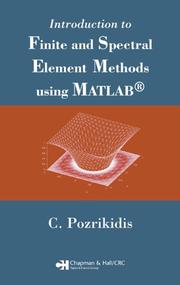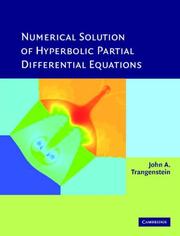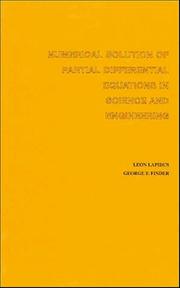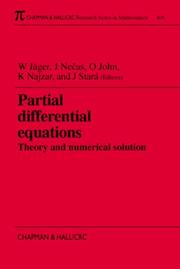| Listing 1 - 10 of 286 | << page >> |
Sort by
|
Book
Year: 1996 Publisher: Hampton : NASA. Langley Research Center,
Abstract | Keywords | Export | Availability | Bookmark
 Loading...
Loading...Choose an application
- Reference Manager
- EndNote
- RefWorks (Direct export to RefWorks)
519.6 --- 681.3 *G18

ISBN: 1584885297 9781584885290 Year: 2005 Publisher: Boca Raton Chapman and Hall/CRC
Abstract | Keywords | Export | Availability | Bookmark
 Loading...
Loading...Choose an application
- Reference Manager
- EndNote
- RefWorks (Direct export to RefWorks)
681.3*G18 --- 519.6 --- Partial differential equations: difference methods; elliptic equations; finite element methods; hyperbolic equations; method of lines; parabolic equations (Numerical analysis) --- Computational mathematics. Numerical analysis. Computer programming --- Finite element method --- Data processing. --- MATLAB. --- 519.6 Computational mathematics. Numerical analysis. Computer programming --- 681.3 *G18 Partial differential equations: difference methods; elliptic equations; finite element methods; hyperbolic equations; method of lines; parabolic equations (Numerical analysis) --- Data processing --- MATLAB (Computer program) --- Matrix laboratory --- 681.3 *G18 --- MATLAB (Computer file)

ISBN: 9780521877275 052187727X Year: 2009 Publisher: Cambridge: Cambridge university press,
Abstract | Keywords | Export | Availability | Bookmark
 Loading...
Loading...Choose an application
- Reference Manager
- EndNote
- RefWorks (Direct export to RefWorks)
Differential equations, Hyperbolic --- Numerical solutions --- Partial differential equations: difference methods; elliptic equations; finite element methods; hyperbolic equations; method of lines; parabolic equations (Numerical analysis) --- 681.3 *G18 Partial differential equations: difference methods; elliptic equations; finite element methods; hyperbolic equations; method of lines; parabolic equations (Numerical analysis) --- 519.63 --- 681.3*G18 --- Hyperbolic differential equations --- Differential equations, Partial --- 519.63 Numerical methods for solution of partial differential equations --- Numerical methods for solution of partial differential equations --- 681.3 *G18
Book
ISBN: 3540089675 9783540089674 Year: 1978 Publisher: Berlin: Springer,
Abstract | Keywords | Export | Availability | Bookmark
 Loading...
Loading...Choose an application
- Reference Manager
- EndNote
- RefWorks (Direct export to RefWorks)
Numerical solutions of differential equations --- Partial differential equations --- 681.3 *G18 --- Partial differential equations: difference methods; elliptic equations; finite element methods; hyperbolic equations; method of lines; parabolic equations (Numerical analysis) --- 681.3 *G18 Partial differential equations: difference methods; elliptic equations; finite element methods; hyperbolic equations; method of lines; parabolic equations (Numerical analysis)
Book
ISBN: 9061964393 Year: 1993 Publisher: Amsterdam Centrum voor Wiskunde en Informatica
Abstract | Keywords | Export | Availability | Bookmark
 Loading...
Loading...Choose an application
- Reference Manager
- EndNote
- RefWorks (Direct export to RefWorks)
519.6 --- 681.3 *G18 --- Computational mathematics. Numerical analysis. Computer programming --- Partial differential equations: difference methods; elliptic equations; finite element methods; hyperbolic equations; method of lines; parabolic equations (Numerical analysis) --- 681.3 *G18 Partial differential equations: difference methods; elliptic equations; finite element methods; hyperbolic equations; method of lines; parabolic equations (Numerical analysis) --- 519.6 Computational mathematics. Numerical analysis. Computer programming
Dissertation
ISBN: 9056826964 Year: 2006 Publisher: Leuven Katholieke Universiteit Leuven
Abstract | Keywords | Export | Availability | Bookmark
 Loading...
Loading...Choose an application
- Reference Manager
- EndNote
- RefWorks (Direct export to RefWorks)
Dit proefschrift beschrijft de ontwikkeling van golfgebaseerde modelleringstechnieken voor het analyseren van stationaire vibro-akoestische problemen. Vaak worden klassieke elementgebaseerde methoden, zoals de eindige-elementenmethode (EEM) en de randelementenmethode (REM), toegepast voor de analyse van dit type van problemen. De toepasbaarheid van de elementgebaseerde methoden is echter beperkt tot het laagfrequente gebied. De golfgebaseerde methode (GBM) is een alternatieve methode die gebaseerd is op een indirecte Trefftz benadering. De GBM is rekenkundig zeer efficiënt, waardoor de methode ook toepasbaar is voor het analyseren van problemen bij hogere frequenties. Dit proefschrift rapporteert over de ontwikkeling van een uitbreiding van de GBM voor het behandelen van akoestische problemen bestaande uit meerdere subdomeinen en voor het analyseren van problemen in oneindige fluïda. De efficiëntie van de GBM is het meest uitgesproken voor problemen met een bescheiden geometrische complexiteit. Een hybride eindige-elementen-golfgebaseerde methode combineert de sterke punten van de twee technieken, namelijk de hoge rekenkundige efficiëntie van de GBM en de toepasbaarheid van de EEM voor problemen met een willekeurige geometrische complexiteit. Numerieke validatievoorbeelden tonen het verhoogde prestatievermogen aan van zowel de uitgebreide GBM voor problemen met een bescheiden geometrische complexiteit, als van de hybride methode voor levensechte ingenieurstoepassingen. This dissertation considers the development of wave based prediction methods for the analysis of steady-state vibro-acoustic problems. Conventional element based prediction methods, such as the finite element method (FEM), are commonly used, but are restricted to low-frequency applications. The wave based method (WBM) is an alternative deterministic technique which is based on the indirect Trefftz approach. The WBM is computationally very efficient, allowing the analysis of problems at higher frequencies. This dissertation reports on an extension of the WBM to multi-domain acoustic problems and problems involving unbounded acoustic fluid domains, such as transmission, scattering and radiation problems. The efficiency of the WBM is most pronounced for problems of moderate geometrical complexity. A hybrid finite element-wave based method combines the strengths of the two methods, namely, the high computational efficiency of the WBM and the ability of the FEM to model problems of arbitrary geometrical complexity. Numerical validation examples show the enhanced computational efficiency of the WBM for problems of moderate geometrical complexity and of the hybrid method for real-life engineering problems. De steeds strenger wordende wettelijke reglementeringen inzake menselijke blootstelling aan trillingen en lawaai en de steeds hogere comforteisen van hun klanten zijn de twee belangrijkste redenen waarom fabrikanten meer en meer belang hechten aan het verbeteren van het trillings- en lawaai-opwekkende gedrag van hun producten. Om dit zogenaamde vibro-akoestische gedrag op een goedkope en efficiënte manier te bestuderen en te verbeteren, wordt in een moderne ontwerpomgeving steeds vaker gebruik gemaakt van computermodellen. Met deze computermodellen kan een ontwerpingenieur voorspellen hoeveel lawaai en hoeveel trillingen zijn product zal veroorzaken. De technieken die momenteel bestaan om zulke computermodellen te maken, zijn echter niet altijd bruikbaar en leveren niet altijd alle gewenste informatie. Daarom zijn er in dit doctoraatswerk nieuwe technieken ontwikkeld die de beperkingen van de bestaande technieken voor een groot deel opheffen. Hierdoor kunnen computermodellen nog efficiënter gebruikt worden bij het voorspellen en verbeteren van het vibro-akoestische gedrag van een product.
Academic collection --- 681.3*G18 <043> --- 534 <043> --- 534 <043> Vibrations. Acoustics--Dissertaties --- Vibrations. Acoustics--Dissertaties --- 681.3*G18 <043> Partial differential equations: difference methods; elliptic equations; finite element methods; hyperbolic equations; method of lines; parabolic equations (Numerical analysis)--Dissertaties --- Partial differential equations: difference methods; elliptic equations; finite element methods; hyperbolic equations; method of lines; parabolic equations (Numerical analysis)--Dissertaties --- Theses
Book
ISBN: 0198533519 9780198533511 Year: 1979 Publisher: Oxford: Clarendon,
Abstract | Keywords | Export | Availability | Bookmark
 Loading...
Loading...Choose an application
- Reference Manager
- EndNote
- RefWorks (Direct export to RefWorks)
Numerical solutions of differential equations --- Differential equations, Partial --- Numerical solutions --- 519.63 --- -681.3 *G18 --- Partial differential equations --- Numerical methods for solution of partial differential equations --- Partial differential equations: difference methods; elliptic equations; finite element methods; hyperbolic equations; method of lines; parabolic equations (Numerical analysis) --- Numerical solutions. --- 681.3 *G18 Partial differential equations: difference methods; elliptic equations; finite element methods; hyperbolic equations; method of lines; parabolic equations (Numerical analysis) --- 519.63 Numerical methods for solution of partial differential equations --- 681.3 *G18 --- Numerical analysis --- Differential equations, Partial - Numerical solutions --- Analyse numerique --- Equations aux derivees partielles
Book
ISBN: 9783642142062 9783642142055 Year: 2010 Publisher: Berlin Heidelberg Springer Berlin Heidelberg
Abstract | Keywords | Export | Availability | Bookmark
 Loading...
Loading...Choose an application
- Reference Manager
- EndNote
- RefWorks (Direct export to RefWorks)
Fluid-structure interactions (FSI), i.e., the interplay of some moveable or deformable structure with an internal or surrounding fluid, are among the most widespread and most challenging coupled or multi-physics problems. Although much has been accomplished in developing good computational FSI methods and despite convincing solutions to a number of classes of problems including those presented in this book, there is a need for more comprehensive studies showing that the computational methods proposed are reliable, robust, and efficient beyond the classes of problems they have successfully been applied to.This volume of LNCSE, a sequel to vol. 53, which contained, among others, the first numerical benchmark for FSI problems and has received considerable attention since then, presents a collection of papers from the "First International Workshop on Computational Engineering - special focus FSI," held in Herrsching in October 2009 and organized by three DFG-funded consortia. The papers address all relevant aspects of FSI simulation and discuss FSI from the mathematical, informatical, and engineering perspective.
Mathematics. --- Computational Science and Engineering. --- Theoretical, Mathematical and Computational Physics. --- Appl.Mathematics/Computational Methods of Engineering. --- Computer science. --- Engineering mathematics. --- Mathématiques --- Informatique --- Mathématiques de l'ingénieur --- Fluid-structure interaction. --- 681.3*G18 --- 519.63 --- Structure-fluid interaction --- Fluid dynamics --- Structural dynamics --- Partial differential equations: difference methods; elliptic equations; finite element methods; hyperbolic equations; method of lines; parabolic equations (Numerical analysis) --- Numerical methods for solution of partial differential equations --- 519.63 Numerical methods for solution of partial differential equations --- 681.3 *G18 Partial differential equations: difference methods; elliptic equations; finite element methods; hyperbolic equations; method of lines; parabolic equations (Numerical analysis) --- Fluid-structure interaction --- 681.3 *G18

ISBN: 0471098663 9780471098669 Year: 1982 Publisher: New York (N.Y.): Wiley,
Abstract | Keywords | Export | Availability | Bookmark
 Loading...
Loading...Choose an application
- Reference Manager
- EndNote
- RefWorks (Direct export to RefWorks)
From the reviews of Numerical Solution of Partial Differential Equations in Science and Engineering:* "The book by Lapidus and Pinder is a very comprehensive, even exhaustive, survey of the subject . . . [It] is unique in that it covers equally finite difference and finite element methods."-Burrelle's.* "The authors have selected an elementary (but not simplistic) mode of presentation. Many different computational schemes are described in great detail . . . Numerous practical examples and applications are described from beginning to the end, often with calculated results given."-Mathematics of Computing.* "This volume . . . devotes its considerable number of pages to lucid developments of the methods [for solving partial differential equations] . . . the writing is very polished and I found it a pleasure to read!"-Mathematics of ComputationOf related interest . . .NUMERICAL ANALYSIS FOR APPLIED SCIENCE Myron B. Allen and Eli L. Isaacson. A modern, practical look at numerical analysis, this book guides readers through a broad selection of numerical methods, implementation, and basic theoretical results, with an emphasis on methods used in scientific computation involving differential equations. 1997 (0-471-55266-6) 512 pp.APPLIED MATHEMATICS Second Edition, J. David Logan. Presenting an easily accessible treatment of mathematical methods for scientists and engineers, this acclaimed work covers fluid mechanics and calculus of variations as well as more modern methods-dimensional analysis and scaling, nonlinear wave propagation, bifurcation, and singular perturbation. 1996 (0-471-16513-1) 496 pp.
Science --- Engineering mathematics --- Differential equations, Partial --- Mathematics --- Numerical solutions --- 519.63 --- -Engineering mathematics --- -681.3 *G18 --- Natural science --- Science of science --- Sciences --- Engineering --- Engineering analysis --- Mathematical analysis --- Partial differential equations --- Numerical methods for solution of partial differential equations --- Partial differential equations: difference methods; elliptic equations; finite element methods; hyperbolic equations; method of lines; parabolic equations (Numerical analysis) --- Engineering mathematics. --- Numerical solutions. --- Mathematics. --- 681.3 *G18 Partial differential equations: difference methods; elliptic equations; finite element methods; hyperbolic equations; method of lines; parabolic equations (Numerical analysis) --- 519.63 Numerical methods for solution of partial differential equations --- 681.3 *G18 --- Numerical analysis --- Science - Mathematics --- Differential equations, Partial - Numerical solutions --- Analyse numerique --- Equations aux derivees partielles

ISBN: 1584880228 9781584880226 Year: 2000 Volume: 406 Publisher: Boca Raton (Fla.): Chapman & Hall/CRC,
Abstract | Keywords | Export | Availability | Bookmark
 Loading...
Loading...Choose an application
- Reference Manager
- EndNote
- RefWorks (Direct export to RefWorks)
As a satellite conference of the 1998 International Mathematical Congress and part of the celebration of the 650th anniversary of Charles University, the Partial Differential Equations Theory and Numerical Solution conference was held in Prague in August, 1998. With its rich scientific program, the conference provided an opportunity for almost 200 participants to gather and discuss emerging directions and recent developments in partial differential equations (PDEs).This volume comprises the Proceedings of that conference. In it, leading specialists in partial differential equations, calculus of variations, and numerical analysis present up-to-date results, applications, and advances in numerical methods in their fields. Conference organizers chose the contributors to bring together the scientists best able to present a complex view of problems, starting from the modeling, passing through the mathematical treatment, and ending with numerical realization. The applications discussed include fluid dynamics, semiconductor technology, image analysis, motion analysis, and optimal control.The importance and quantity of research carried out around the world in this field makes it imperative for researchers, applied mathematicians, physicists and engineers to keep up with the latest developments. With its panel of international contributors and survey of the recent ramifications of theory, applications, and numerical methods, Partial Differential Equations: Theory and Numerical Solution provides a convenient means to that end.
Differential equations, Partial --- 519.63 --- 681.3*G18 --- 517.95 --- Numerical methods for solution of partial differential equations --- Partial differential equations: difference methods; elliptic equations; finite element methods; hyperbolic equations; method of lines; parabolic equations (Numerical analysis) --- Partial differential equations --- 517.95 Partial differential equations --- 681.3 *G18 Partial differential equations: difference methods; elliptic equations; finite element methods; hyperbolic equations; method of lines; parabolic equations (Numerical analysis) --- 519.63 Numerical methods for solution of partial differential equations --- 681.3 *G18 --- Differential equations, Partial - Congresses
| Listing 1 - 10 of 286 | << page >> |
Sort by
|

 Search
Search Feedback
Feedback About UniCat
About UniCat  Help
Help News
News